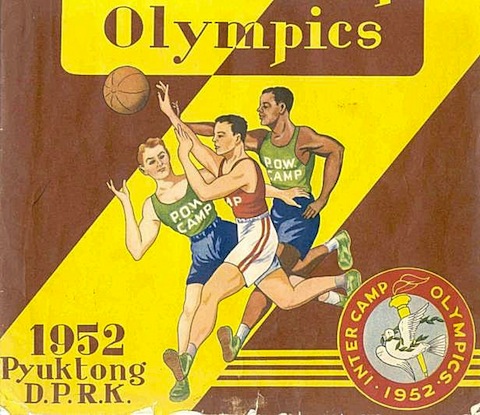
Given my attraction to tales about how folks cope with nasty twists of fate, I was bowled over to discover this rarest of Korean War artifacts: a program from the 1952 prisoner-of-war Olympics held at Pyoktong, North Korea. In addition to containing numerous photos of the sports contested—such as tug of war, football, and bizarre gymnastics, the booklet offers the thoughts of various participants. Their enthusiasm for the whole endeavor can either be construed as touching or deeply ominous:
It is a great honer for me to introduce you to this splendid book. Here, told in pictures, is the story of the greatest spectacle of our stay here in North Korea,the Inter- Camp Olympics of 1952. Each page servers as a guide that shall enable you to relive all the spine-tilling excitement of that truly marvelous athletic meet.
From the very moment the opening cerimonies began on November 15 until the closing of the meet on November 26 we witnessed splendid performances, thrills galore, great enthusiasm, sincere and wholehearted sportsmanship, and perfect goodwill among the many nationalities represented there….
Another very important factor in making this an unforgettable occasion was the attitude of the Korean People’s Army and the Chinese People’s Volunteers. Without their efforts such a tremendous undertaking could not have been possible, At all times the cooperation, generosity, enthusiasm, and selfless energy displayed by our captors was perfect and left absolutely nothing to be desired. The lenient treatment policy has long ago passes its title of lenient, it has instead become a brotherly love treatment for every one of us. The materials provided for the athletic meet, plus the grand array of expensive prizes and awards,were more than sufficent to prove the cincerity of the camp authorities of the Korean Peoples Army and the Chinese Peoples Volunteers in ensuring success of our first Inter-Camp Olympics
This book symbolizes the real will of all humanity to live in a spirt of brotherhood, in a world peace, free from fear, hatred, malace or antagonism. Here you can see vividly the harmonious atmosphere that pronailed at all times among men of various nationalities, races, creeds and colours.
So the question is, Should those who participated in these Olympics be condemned as collaborators, or hailed for keeping spirits aloft in the most trying of circumstances. A surprisingly even-handed discussion of that question can be found here.
And more photos of daily life in a Korean War POW camp here—with the caveat that the collection’s bounty of smiling faces tells only a stage-managed version of the truth.


Lennox // Feb 5, 2012 at 10:48 pm
Notice the “typos” .. A common resistance technique among POWs was to find anyway possible to undermine the propaganda they were forced to make without being detected. Consider the specific context of each mistake.
‘Each page servers as a guide’
‘spine-tilling excitement’
‘cincerity of the camp authorities’
‘opening cerimonies’
and especially,
‘the harmonious atmosphere that pronailed at all times..’
If you squint your eyes just right and take the mistakes as not being mistakes at all, but rather perfectly intentional and literal, a picture in distinct contrast to the stated message is revealed.
Brendan I. Koerner // Feb 6, 2012 at 9:17 am
@Lennox: Very interesting. I’ve come across this phenomenon in messages sent home by American POWs in Vietnam. Wish I could dig up this one letter from a “Hanoi Hilton” inmate, which is rife with spelling errors that doubled as coded messages. Will try to find it tonight…
The Art of Getting By | Microkhan by Brendan I. Koerner // Sep 21, 2012 at 10:36 am
[…] while back, I explored the athletic means by which American prisoners-of-war coped with confinement in North Korea. That story popped to mind […]